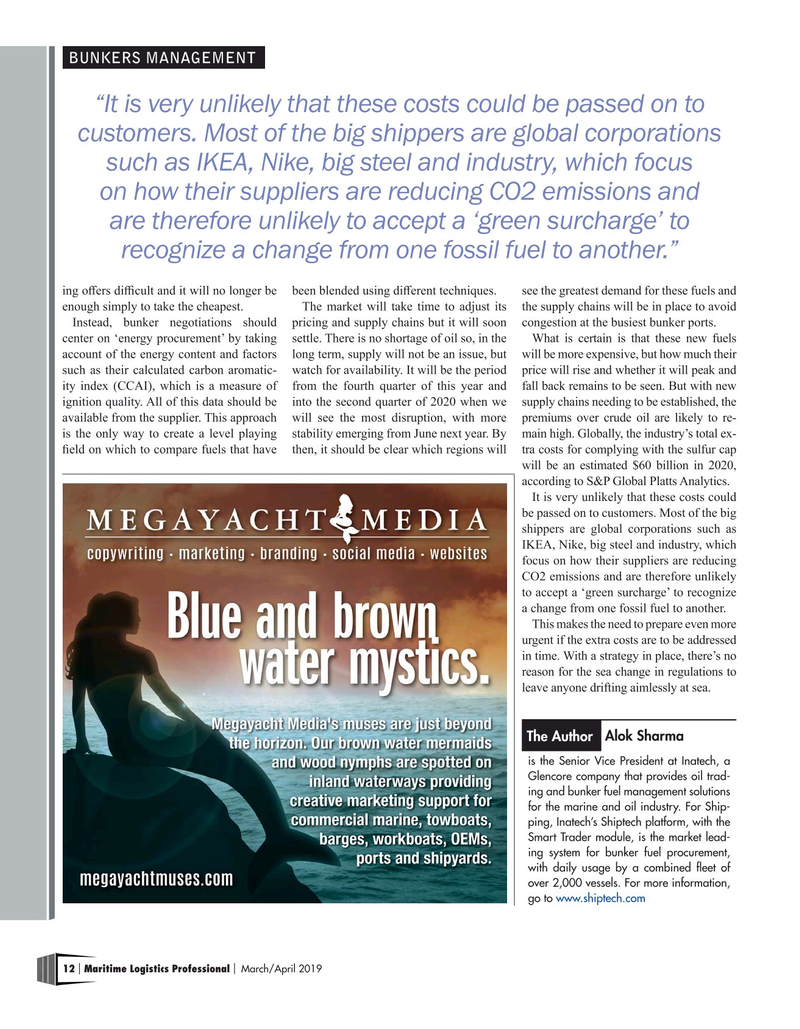
Page 12: of Maritime Logistics Professional Magazine (Mar/Apr 2019)
Container Ports
Read this page in Pdf, Flash or Html5 edition of Mar/Apr 2019 Maritime Logistics Professional Magazine
BUNKERS MANAGEMENT “It is very unlikely that these costs could be passed on to customers. Most of the big shippers are global corporations such as IKEA, Nike, big steel and industry, which focus on how their suppliers are reducing CO2 emissions and are therefore unlikely to accept a ‘green surcharge’ to recognize a change from one fossil fuel to another.” + #M + #+ R #! see the greatest demand for these fuels and enough simply to take the cheapest. The market will take time to adjust its the supply chains will be in place to avoid
Instead, bunker negotiations should pricing and supply chains but it will soon congestion at the busiest bunker ports.
center on ‘energy procurement’ by taking settle. There is no shortage of oil so, in the What is certain is that these new fuels account of the energy content and factors long term, supply will not be an issue, but will be more expensive, but how much their such as their calculated carbon aromatic- watch for availability. It will be the period price will rise and whether it will peak and ity index (CCAI), which is a measure of from the fourth quarter of this year and fall back remains to be seen. But with new ignition quality. All of this data should be into the second quarter of 2020 when we supply chains needing to be established, the available from the supplier. This approach will see the most disruption, with more premiums over crude oil are likely to re- is the only way to create a level playing stability emerging from June next year. By main high. Globally, the industry’s total ex- / # 4 then, it should be clear which regions will tra costs for complying with the sulfur cap # V according to S&P Global Platts Analytics.
It is very unlikely that these costs could be passed on to customers. Most of the big shippers are global corporations such as
IKEA, Nike, big steel and industry, which focus on how their suppliers are reducing
CO2 emissions and are therefore unlikely to accept a ‘green surcharge’ to recognize a change from one fossil fuel to another.
This makes the need to prepare even more urgent if the extra costs are to be addressed in time. With a strategy in place, there’s no reason for the sea change in regulations to leave anyone drifting aimlessly at sea.
The Author Alok Sharma is the Senior Vice President at Inatech, a
Glencore company that provides oil trad- ing and bunker fuel management solutions for the marine and oil industry. For Ship- ping, Inatech’s Shiptech platform, with the
Smart Trader module, is the market lead- ing system for bunker fuel procurement, with daily usage by a combined ?eet of over 2,000 vessels. For more information, go to www.shiptech.com 12 Maritime Logistics Professional March/April 2019 | |

 11
11

 13
13
